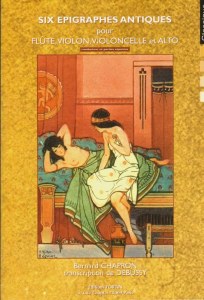Rechercher
Votre panier
Six épigraphes antiques
Référence Editions Fortin
Claude Debussy " Six épigraphes antiques " Transcription pour flûte, violon, violoncelle et alto par Bernard Chapron
A l'écoute :
Epigraphe 1 Pour invoquer Pan
Epigraphe 2 Pour un tombeau sans nom
Epigraphe 3 Pour que la nuit
Epigraphe 4 Pour la danseuse
Epigraphe 5 Pour l'Egyptienne .mp3
Epigraphe 6 Pour remercier la pluie
Debussy’s Bilitis Songs were originally for the stage, to accompany a recitation of the text. The original scoring included two flutes, and the work was composed in 1897-8. Debussy later re-scored the melodic material to create the Six Epigraphes Antiques for two pianos. This arrangement returns the melody lines to the flutes, and includes very sensitive scoring for the strings. The arrangement is entirely natural and works extremely well. The playing here is similarly excellent; Chapron’s flute playing is sensitive, beautifully controlled and uses a vast array of tone colours. He has a natural instinct for the shaping of the phrases and is clearly passionate about the music. He is accompanied by three highly accomplished string players, who create atmosphere where required, bringing solo lines out of the texture and then returning to an accompanying role. The sense of ensemble is always excellent and the quality is consistently high.
Carla Rees
http://www.musicweb-international.com/classrev/2008/Sept08/Debussy_QM7008.htm#ixzz5CAVKsKpg






